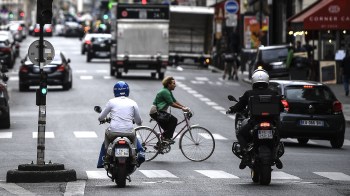A French revolution on two wheels
TEXT OF STORY
BOB MOON: Just in time for Bastille Day tomorrow authorities in Paris are launching something new. They hope it’s going to revolutionize the city’s transportation system. Velib’ is one of the the biggest city bike networks the world has ever seen. For a small fee, Parisians will be able to borrow one of over 10,000 specially designed bicycles. They can be picked up at 750 new bike stations around the city. John Laurenson went along for the ride.
JOHN LAURENSON: Cycling past Notre Dame Cathedral on a summer morning, tourists scattering like pigeons when you ring your bell . . . no other mode of transport gives you quite that sense of freedom. Velo for bicycle. Lib’ for Liberty, Equality, Fraternity, the motto of the French republic. For Celine Lepault, in charge of Velib’ at Paris city council, this is a French Revolution.
Celine Lepault [interpreter]: Our aim at Paris city hall is to encourage soft modes of transport that don’t pollute and which improve the quality of life. We’ve now got 250 miles of cycle lanes and 100,000 trips are day are made by bike. But with Velib’ we can triple that number because people will no longer have to worry about getting their bike stolen or where to leave it at night. And once they try it they’ll see that what our surveys tell us is true: That riding a bike is safer than driving a car. Safer even than walking.
Once thousands of cycling first-timers are unleashed on the city, using the Velib’ probably will be very much safer than walking. It’s simple to use. A day’s subscription costs one euro — about $1.40. Down at one of the new bike stations, Velib’ assistant Jonathan shows me how.
Jonathan: You go in a station, directly with your credit card, and you take a subscription. For the week, five euros. For the year, 29 euros. And after that you can bike everywhere in Paris. The first half hour is free every time. The next is one euro, after it’s two euro, and then after that it is four euros for every half hour.
Laurensen: “So you just like . . . Oh, OK. And I’m away! Changing the gears. Here we go. Second. Not bad! Not a bad ride. Very stable. But will Parisians want to use it?
Man 1: I don’t think so because I think it’s useless. Very costly. And everybody has his own bicycle.
Man 2: I will use Velib’ when I leave discotheque when taxi is too expensive and when the service of buses is not very good.
Man 3:: I can’t because I go from one side of the town to the other so I have to use the subway.
So, apart from disco boy, not much enthusiasm there. And it’s not as if Velib’ comes cheap. The company that does Paris’ street furniture is supplying the bikes and the stations in exchange for the use for a decade of the city’s 1,800 advertising spaces. The estimated loss of revenues for the city is $700 million for this latest anticar offensive.
Motorists already have to put up with the cycle and bus lanes, new trams and fewer parking spaces. And the Velib? The motorists jammed in traffic alongside the new bus lane n Boulevard Montparnasse say they’re all for it.
Man 4 [interpreter]: I used to live in Lyons where we’ve already got a similar scheme and I can’t wait for Velib’ to get started. I want to see bicycles everywhere so we can stop using our cars which cause all sorts of problems. And I’ll definitely use it myself. For short journeys at least.
But if Paris is on its way to taming the traffic beast, it’s not there yet.
A van driver and a motorcyclist face off after a crash near the Louvre Museum. The van, turning right, hit the scooter that was speeding, illegally, up the cycle lane. Thankfully no one’s injured. Not until the motorcyclist punches the van driver. Revolutions usually have their casualities. Paris’ transport revolution is unlikely to be an exception.
In Paris, I’m John Laurenson for Marketplace.
There’s a lot happening in the world. Through it all, Marketplace is here for you.
You rely on Marketplace to break down the world’s events and tell you how it affects you in a fact-based, approachable way. We rely on your financial support to keep making that possible.
Your donation today powers the independent journalism that you rely on. For just $5/month, you can help sustain Marketplace so we can keep reporting on the things that matter to you.


















